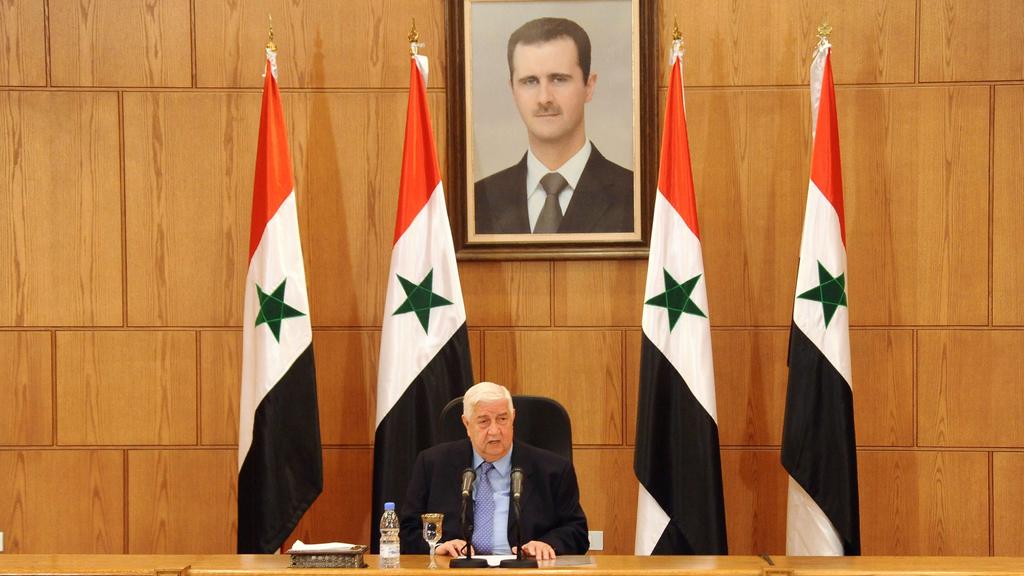
ASSAD’S ALLIES
Syrian foreign minister visits Russia as regime makes gains

Walid Muallem arrives in Russia today to discuss economic cooperation with Russian Foreign Minister Sergei Lavrov.
Bashar al-Assad’s regime appears to have the upper hand in Syria’s civil war. With Russian and Iranian military support, it’s currently escalating its conflict against rebel forces and ISIS, both of which are on the back foot. Yet Moscow may be looking to scale back its commitment as Damascus and Tehran seek to push harder against rebels in “de-escalation zones” which Russia wished to be conflict-free.
Opposition to Assad remains. UK Foreign Secretary Boris Johnson said a group of Western and Gulf countries, including Saudi Arabia and the UAE, “will not support the reconstruction of Syria” without a “transition away from Assad”. The dictator’s multiple chemical weapons attacks on his own citizens have made him unpalatable to many, including the US.
For Assad, Russia’s wavering commitment would further increase his dependence on Iran. Either way, his regime is set to stay.
A RECEDING TIDE?
Libyan coast guard begins training to stem migrant flows

A two-month training program for Libya’s coast guard begins today in Tunisia, and will subsequently move to Italy.
Italy has recently witnessed a decline in migrant arrivals, which fell 85% in August from the previous year. This drop has been attributed to local militias working to keep migrants from departing Libya’s shores, rather than Italian efforts to police the Mediterranean. Some have accused Rome of paying the militias to do so, an accusation the government vehemently denies.
In either case, Libya’s fluid political situation leaves local militias vulnerable to losing power. A more stable option could be General Khalifa Haftar, whose Libyan National Army controls the country’s east. He has promised to police Libya’s southern border in return for aid and military equipment from Europe.
Italy’s centre-left government will likely continue to court Haftar—it needs migrant flows to stay down ahead of elections due by May 2018. If not, populist parties could make gains off a xenophobic campaign.
TERRORIST TRIALS
Nigeria tries 1,600 accused of being Boko Haram members

Today, Nigeria’s Federal High Court will begin the trials of more than 1,600 alleged members of the ISIS-linked extremist group Boko Haram.
A judicial hiatus in July brought trials to a halt—only 13 had been concluded prior to the break. Just four judges have been appointed to sit on the 1,600 cases, making their speedy execution unlikely.
A scarcity of forensic evidence, an overreliance on confession-based evidence and a lack of cooperation between investigators and prosecutors will plague the trials, possibly jeopardising the accuracy of their rulings.
Nigeria has been accused of numerous human rights violations throughout its conflict with Boko Haram. Thousands of extrajudicial killings, arbitrary arrests and deaths under military detention have been cited by groups like Amnesty International.
A split within Boko Haram has significantly weakened the cohesiveness of the organisation, which has given Nigerian forces a significant upper hand in the conflict over the past few months. At this point, the group only controls small swaths of territory in northeastern Nigeria.
A DISPLAY AT DOKLAM
Indian forces plan response to Chinese actions at Doklam Plateau

Today, India’s top military brass will hold a conference to discuss military preparedness in the Doklam region, following reports that the Chinese have increased their military presence in the contentious region.
A ten-week dispute between Asia’s two most populous countries was assuaged in late August, with New Delhi agreeing to withdraw its troops from the disputed territory. Beijing pulled its forces back a few hundred metres from the conflict zone and halted construction of a major road that cut through the Doklam Plateau, territory claimed by Indian regional ally Bhutan.
In spite of this, Indian surveillance of Chinese military instalments in the region has increased following reports that Beijing has begun expanding a road just 10 kilometres from the conflict zone.
Given that Beijing’s construction is only on existing infrastructure that is removed from the site of the dispute, it is unlikely that this will spark another conflict. Similarly, with the Communist Party Congress taking place in just over a week, Beijing wishes to avoid another high-stakes dispute with India. The move is likely a show of Chinese resolve to maintain what it claims is its territory in the future.
HAPPENING ELSEWHERE…
Myanmar ceasefire ends, Erdogan in Ukraine, fifth round of Brexit talks

A government-declared ceasefire in Myanmar’s Rakhine state comes to an end at 1830 GMT today. It’s uncertain whether the measures will be extended; if not, there are fears of renewed fighting. More than half a million Rohingya have fled Myanmar in the past month and now live in squalid conditions in Bangladesh.
Turkish President Recep Tayyip Erdogan will be in Ukraine today for talks with his counterpart, Petro Poroshenko. Mr Erdogan’s visit follows hot on the heels of discussions with Vladimir Putin in Moscow.
A fifth round of Brexit negotiations will begin.

